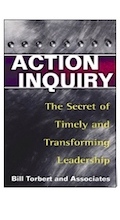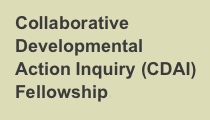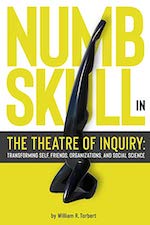In this blog entry and newsletter, I want to bring your attention to some potent new tools for practicing the exercise of mutual power.
Mutual Power
The theory and practice of Collaborative Developmental Action Inquiry claims, illustrates, and presents research data that support the notion that mutual power is more powerful than unilateral power. Unilateral power sometimes causes people to conform. But only the exercise of mutual power can cause people or institutions to transform.
More particularly, only the exercise of mutual power can transform humanity’s relationship to nature and the crises of global climate change created by the unilateral power of empirically-positivist science and technology. Only the exercise of mutual power can transform the relationships between men and women from widespread exploitativeness, abuse, and loneliness to love. Only learning the exercise of mutual power can help humanity create A.I. (artificially intelligent) machines that will operate, once they are smarter than us, on the basis of mutual power, rather than unilaterally creating goals that may well destroy or neutralize human life altogether. Only the exercise of mutual power can substitute for the use of unilateral armaments and wars when different human groups come into conflict.
The Potent Tools
In partnership with the Center for Creative Leadership, Elaine Herdman Barker and Bill Torbert of Action Inquiry Associates have created a set of cards called TRANSFORMATIONS which can be used in a wide variety of ways in organizations to support leadership and team development or a shared vision for the whole organization. The cards can be used without any prior knowledge of leadership development theory to help persons begin to recognize the developmental action-logics that guided their leadership earlier in life, the action-logics that guide them now, and the ones they aspire to grow into. These self-estimates of one’s own leadership action-logic can later be tested against the psychometric analysis of the Global Leadership Profile (GLP). The decks are less expensive than a GLP and can be used again and again with different people. For further information, go to www.ccl.org/transformations and/or contact Chuck Palus (palusc@ccl.org ).
DEEP DEMOCRACY is a powerful method for exercising mutual power in exploring conflict and emergent shared vision, originating from South Africa. Action Inquiry Fellow Aftab Erfan and her colleague, Sera Thompson are offering two-day DEEP DEMOCRACY workshops in Seattle, April 14-15, San Francisco, April 22-23, and Boston, May 28-29. Learn more by clicking on www.deepdemocracy.ca . Erfan and Thompson are also offering a Civic Forum titled “Is Hope Bullshit?” in San Francisco on April 24.
Action Inquiry Fellow Ed Kelly leads THE THIRD ACT CONFERENCE on April 26 in Ireland – how do we turn our increasingly long third age, not into retirement, but into a qualitatively different “third act”? And AI Fellow Mary Stacey, along with poet David Whyte and others, convenes the Burren Executive Leadership Retreat (also in Ireland), August 21-24.
Books can be potent tools too. Our friends Bob Kegan and Lisa Lahey illustrate how mutual power through feedback works in three highly successful organizations in their new book, AN EVERYONE CULTURE: BECOMING A DELIBERATELY DEVELOPMENTAL ORGANIZATION. Action Inquiry Fellow Keith Merron and his colleague Barbara Annis have recently published GENDER INTELLIGENCE: BREAKTHROUGH STRATEGIES FOR INCREASING DIVERSITY AND IMPROVING YOUR BOTTOM LINE. And, as we highlighted in our last blog post and newsletter, Action Inquiry Fellows Hilary Bradbury and Bill Torbert have recently published EROS/POWER: LOVE IN THE SPIRIT OF INQUIRY, about learning to exercise mutual power in love relationships. The books are available at Amazon.
In addition, we remind you that three more ACTION INQUIRY & GLP Workshops are being offered this year – in Spain and Sweden in September and in Boston in November. See the Calendar of Events








{ 0 comments… add one now }